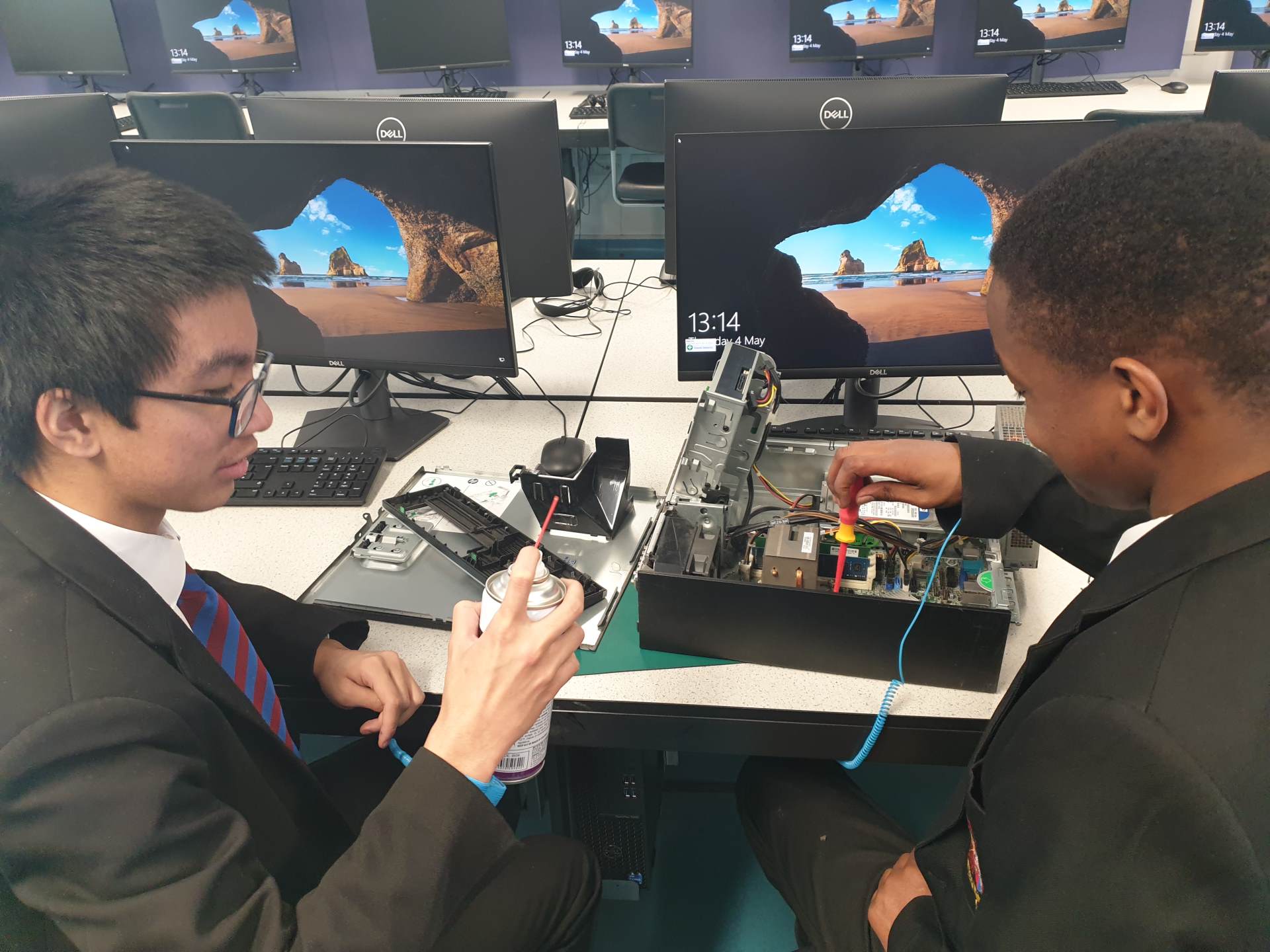IT & Computing
The vision of the department continues to develop in line with that of the government’s. The department now offers both an ICT and a Computer Science qualification at GCSE.
- Pupils are prepared for a world in which Computing is seen as a natural part.
- Every child leaves able to use computing efficiently and effectively at an appropriate level.
- Pupils are aware of the dangers associated with the development of computing and their E-Safety.
- Pupils understand what is meant by programming and have a basic knowledge of coding and algorithms.
- Curricular and extra-curricular activities that enhance learning and enjoyment of the discipline.
- Pupils are aware of the possibilities created by the developments within computing.
- Pupils have an understanding of careers and opportunities in Computing and ICT-related jobs.

Curriculum Overview
Second Form Computing Overview
Fourth Form Computing Overview
Curriculum Content - KS3
The current first and second year pupils are undertaking a two-year KS3 Computing curriculum that the department has devised based on the programme of study by the DfE. This includes some practical programming units using both visual and textual-based languages and theoretical units investigating Hardware and Software and Data representation. All pupils also complete an e-Safety unit.
The School’s Computing (ICT) curriculum has always been dynamic, and the department’s staff have always tried to provide a rich curriculum. We therefore do not foresee a complete redevelopment of the curriculum, but rather some amending and fine-tuning. The department has refined and redeveloped its unique tracking and assessment systems so that they encourage greater pupil reflection and provide pupils with a clearer understanding of their performance in a unit and across the key stage.
Year 7 Topics include:
- Understanding Computers
- Introduction to Python
- Database development (MS Access)
- Networks
- Using computers safely
Year 8 Topics include:
- Computational thinking
- Programming using Python
- HTML & website development
- Modelling using Spreadsheets
- AI & machine learning
Curriculum Content - KS4
Computer Science GCSE (AQA - 8525)
Computer technology continues to advance rapidly. The growth in the use of mobile devices and web-related technologies has exploded, resulting in new challenges for employers and employees. Computing is of enormous importance to the economy, and the role of Computer Science as a discipline itself and as an ‘underpinning’ subject across science and engineering is growing at an exponential rate.
The qualification gives pupils an understanding of key computing concepts and the fundamentals of programming. The course also contains some advanced mathematical concepts, including an understanding of the use of number bases, e.g. binary and hexadecimal notation. Students will need to be able to understand the concepts behind binary arithmetic and base number conversions, and to manipulate and link various programming concepts such as flowcharts, data types, variable manipulation, program flow control, functions, procedures and error handling.
Assessment summary:
Paper 1: Computational thinking, problem solving, code tracing and applied computing, as well as theoretical knowledge of:
- Fundamentals of algorithms
- Programming
Written exam: 2 hours
90 marks
50% of GCSE
Paper 2: Theoretical knowledge of:
- Fundamentals of data representation
- Computer systems
- Fundamentals of computer networks
- Fundamentals of Cyber Security
- Relational databases and structured query language (SQL)
- Ethical, legal and environmental impacts of digital technology on wider society, including issues of privacy
Written exam: 1 hour 45 minutes
90 marks
50% of GCSE
More information: AQA | Computer Science | GCSE | GCSE Computer Science
Cambridge Nationals IT Level 1/Level 2 – J836
Why should you choose this subject?
You may be interested in this if you want an engaging qualification where you will use your learning in practical, real-life situations, such as:
- using different applications and tools to design, create and evaluate IT solutions and products
- creating a data manipulation solution
- creating an Augmented Reality prototype.
This will help you to develop independence and confidence in using skills that would be relevant to the IT sector. The qualification will also help you to develop learning and skills that can be used in other life and work situations, such as:
- planning and designing IT solutions and products for a given purpose
- selecting the best tools and techniques to solve a problem
- solving problems by exploring different software application tools and techniques
- creating IT solutions and digital products
- use of planning techniques to complete tasks in an organised and timely way
- finding imaginative ways to solve IT problems.
Course overview
R050: IT in the digital world
In this unit, you will learn about design and testing concepts for creating an IT solution or product, and the uses of IT in the digital world. Topics include:
- Design Tools
- Human-Computer Interface (HCI) in everyday life
- Data and testing
- Cybersecurity and legislation
- Digital Communications
- Internet of Everything (IoE).
R060: Data manipulation using spreadsheets
In this unit, you will learn how to plan, design, create, test and evaluate a data manipulation spreadsheet solution to meet the client’s requirements.
You will be able to evaluate your solution based on the user requirements. Topics include:
- Planning and designing the spreadsheet solution
- Creating the spreadsheet solution
- Testing the spreadsheet solution
- Evaluating the spreadsheet solution.
R070: Using Augmented Reality to present information
In this unit, you will learn how to design, create, test and review an Augmented Reality model prototype to meet a client’s requirements. Topics include:
- Augmented Reality (AR)
- Designing an Augmented Reality (AR) model prototype
- Creating an Augmented Reality (AR) model prototype
- Testing and reviewing.
Assessment:
Students will need to complete 3 units
|
R050: IT in the digital world |
[Written exam worth 40% of the total qualification]
|
|
R060: Data manipulation using spreadsheets |
[Coursework worth 30% of the total qualification]
|
|
R070: Using Augmented Reality to present information
|
[Coursework worth 30% of the total qualification]
|
All results are awarded on the following scale:
Level 2 – Distinction* (*2), Distinction (D2), Merit (M2), Pass (P2) [P2 is equivalent to a GCSE Grade 4]
Level 1 – Distinction (D1), Merit (M1), Pass (P1) and Fail/Unclassified.
Extended curriculum opportunities:
- Industry-recognised Google certification for students invested in data analysis
- Creating spreadsheets to manage aspects of daily life (budgeting, prediction modelling, tracking)
Find out more: Full course specification is at: https://www.ocr.org.uk/qualifications/cambridge-nationals/it-level-1-2-j836/
Curriculum Content - KS5
A Level Computer Science (AQA – 7517)
This A-level can help lead to a wide range of degrees at university including: computer science, software engineering, mathematics, engineering, information systems, computer security, game development and other sciences.
It is an exciting time to be a computer scientist! We are living in the midst of a revolution powered by computers. This revolution has invaded all aspects of society. It is a communication revolution, a transportation revolution, a medical revolution, an entertainment revolution. Consider the things one would need to give up to live a day without computers:
- Social networking: email, IM, Facebook, texting, cell phone, landline phone
- Transportation: GPS, car, planes, trains
- Medical systems: electronic health records, nearly all medical tests
- Commerce: e-commerce, ATMs, credit cards, debit cards
The Cardinal Vaughan Memorial School is pleased to offer Computer Science at A-Level. The course will follow the AQA specification, which is a new and up-to-date syllabus that focuses on the skills students need to progress to higher education or thrive in the workplace.
A-Level specification at a glance:
- Fundamentals of programming
- Fundamentals of data structures
- Fundamentals of algorithms
- Theory of computation
- Fundamentals of data representation
- Fundamentals of computer systems
- Fundamentals of computer organisation and architecture
More information: AQA | Computer Science | A-Level | A-level Computer Science
|
PAPER 1 |
PAPER 2 |
NON-EXAM ASSESSMENT |
|
What's assessed This paper tests a student's ability to program, as well as their theoretical knowledge.
|
What's assessed This paper tests a student's ability to answer questions through extended writing. |
What's assessed The non-exam assessment assesses students' ability to use the knowledge and skills gained through the course to solve or investigate a practical problem. |
|
Assessed On-screen exam: 2 hours 30 minutes 40% of A-level |
Assessed Written exam: 2 hours 30 minutes 40% of A-level |
Assessed 75 marks 20% of A-level |
|
Questions Students answer a series of short questions and write/adapt/extend programs in an electronic answer document |
Questions Compulsory short-answer and extended-answer questions. |
|
Extra-curricular
Year 7 – Programming and Robotics club during lunchtime
Year 8 – Programming in Python club during lunchtime
Year 12 – A-level Computer Science in Action conference



